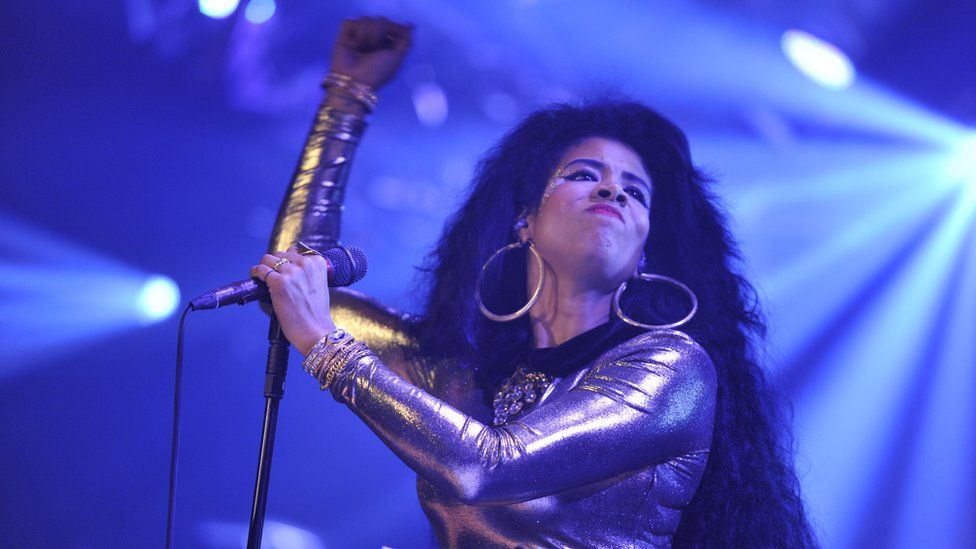

Beyoncé has updated her latest album, Renaissance, in response to criticism from fans and the pop star Kelis.
The song Heated has received a lyrical update, removing a slur that is often used to demean people with spastic cerebral palsy.
In place of the so-called “s-word”, Beyoncé now sings “blast”.

Beyonce
Meanwhile, a reference to Kelis’s hit Milkshake has also disappeared from the album, after the singer complained she had not given permission for its use.
The “la la la” hook from Milkshake was originally used in the background of Beyoncé’s song Energy. Those vocals have now been erased from the mix.
A drum sample – based either on Milkshake or an earlier Kelis track called Get Along With You – remains integral to the song.
The updates happened on streaming services including Spotify, Tidal and Apple overnight on Tuesday, just five days after Renaissance was released.
In a brief glitch, Tidal replaced Energy with a version that only featured the isolated vocals of Beyoncé singing “la la la”, with the rest of the track remaining silent.
It is also too late to change the vinyl and CD editions of the album – although future pressings may contain the revisions.
Beyoncé came under fire from disability advocates over the weekend for including an ableist slur on Heated, which was co-written by Drake.
It came just a few weeks after another US pop star, Lizzo, apologised for using the same derogatory term in her song GRRRLS.
Both Lizzo and Beyoncé said they were unaware of the connotations of the word – whose links to cerebral palsy are less well-known in the US.
In a statement on Monday, Beyoncé’s publicist said: “The word, not used intentionally in a harmful manner, will be replaced in the lyrics”.
The Kelis story is less clear-cut.

The singer took to social media last week, accusing Beyoncé of “theft” after learning her anthem Milkshake had been interpolated on the song Energy (interpolation is when one song references another, without directly sampling it).
Kelis said she had not been informed in advance, and that her mind was “blown” by the “level of disrespect”.
“It’s not hard. She can contact me, right?” Kelis said on Instagram. “It’s common decency.”
However, Beyoncé would not have had to seek Kelis’s permission to reference Milkshake, as the singer is not a credited writer on the song and does not own the copyright.
Instead, permission would have been sought from writer/producers Pharrell Williams and Chad Hugo – and Kelis’s disagreement is largely with them.
She has previously accused the duo, professionally known as the Neptunes, of “lying and tricking” her into a bad deal, which gave them the rights to her music at the start of her career.
“I was told we were going to split the whole thing 33/33/33, which we didn’t do,” she told the Guardian in 2020. “Their argument is, ‘Well, you signed it.’
“I’m like, ‘Yeah, I signed what I was told, and I was too young and too stupid to double-check it.'”
Third party content may contain adverts
In an Instagram video about Beyoncé’s song, she confirmed that Pharrell, in particular, was the source of her frustration.
“Publishing was stolen, people were swindled out of rights. It happens all the time, especially back then. So it’s not about me being mad about Beyoncé.
“Pharrell knows better,” she added. “This is a direct hit at me [and] he does this stuff all the time. It’s very petty [and] the reason I’m annoyed is because I know it was on purpose.”
Beyoncé appears to have sided with the singer, by removing the reference to Milkshake – although Pharrell and Chad Hugo still receive a writing credit, presumably for the brief sample of Get Along With You.
Meanwhile, Monica Lewinsky has tweeted a request for Beyoncé to consider adjusting a lyric in her 2013 song Partition, which references her affair with President Clinton.
Linking to a news story about the lyric change on Heated, Lewinsky wrote: “Uhmm, while we’re at it… #Partition”.
Asked if she had ever mentioned the song to Beyoncé’s team, Lewinsky replied: “No, I haven’t. I did mention it in the first Vanity Fair article I wrote in 2014, which was the first public thing I’d done in 10 years. But you make an interesting point.”
It is not unusual for musicians to update albums after release in the streaming era.
Kanye West, a former Beyoncé collaborator, has turned it into an artform. In 2016, on the day he released his seventh album The Life Of Pablo, he tweeted: “Im’a fix Wolves” – referring to one of the album’s key songs.
A month later, the original version of the track was replaced, featuring new vocals from Australian pop star Sia. Frank Ocean’s contribution to the song was then separated out, and given it’s own track on the album, simply known as Frank’s Track. – bbc.com